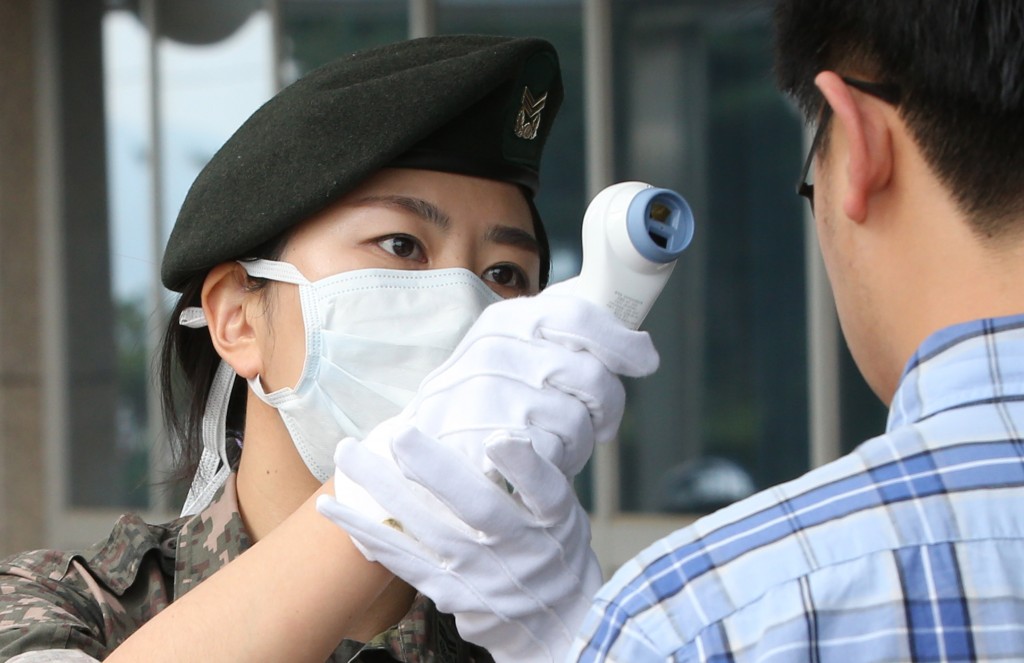- California Assembly OKs highest minimum wage in nation
- S. Korea unveils first graphic cigarette warnings
- US joins with South Korea, Japan in bid to deter North Korea
- LPGA golfer Chun In-gee finally back in action
- S. Korea won’t be top seed in final World Cup qualification round
- US men’s soccer misses 2nd straight Olympics
- US back on track in qualifying with 4-0 win over Guatemala
- High-intensity workout injuries spawn cottage industry
- CDC expands range of Zika mosquitoes into parts of Northeast
- Who knew? ‘The Walking Dead’ is helping families connect
WHO: MERS not spreading outside S. Korea hospitals
SEOUL, South Korea (AP) — The MERS virus in South Korea, which has killed 14 people and infected nearly 140 in the largest outbreak outside the Middle East, hasn’t spread outside hospitals among the wider community or become easier to transmit between humans, the World Health Organization said.
After a weeklong review of the outbreak of Middle East respiratory syndrome, experts from WHO and South Korea told reporters Saturday there was no evidence to suggest the virus, currently confined around health facilities, is spreading. It has been occurring among hospital patients, visiting family members and medical staff.
Overcrowded emergency rooms and hospital wards might have contributed to a wider-than-expected transmission of the virus, which usually spreads poorly between people, said WHO Assistant Director Keiji Fukuda.
South Korea’s habits of “doctor shopping” — visiting multiple facilities to treat the same infection — and having many friends and family members visiting hospitalized patients also might have contributed, he said.
The continued discovery of new cases — including 12 on Saturday — has created an impression that the outbreak is getting bigger, but Fukuda noted that many of the cases being reported involved people who already had been infected. New infections appear to be declining, which suggests that the government’s control measures are having an impact, he said.
“Now, because the outbreak has been large and is complex, more cases should be anticipated,” he said.
The virus has spread at a pattern similar to previous outbreaks in the Middle East, and the sequencing studies of samples from South Korea show no signs that the virus has increased its ability to transmit between humans, he said.
While the infections seem to be stagnating, Fukuda called on the South Korean government to continue with strong control measures, including tracing patients’ contacts and preventing suspected cases from traveling.
The outbreak of the poorly understood disease, which has no vaccine and had a mortality rate as high as 40 percent , has caused widespread fear in South Korea and criticism that health workers and the government failed to initially recognize and quickly contain it.
A 67-year-old woman who had been combating thyroid problems and high blood pressure before she was diagnosed with MERS became South Korea’s 14th and latest fatality, the Health Ministry said.
Nearly 140 people have been diagnosed with MERS since last month. Among those infected, 16 are in serious condition, said Jeong Eun-kyeong, a senior official from the Korea Centers for Disease Control and Prevention.
About 2,900 schools and kindergartens remained closed and more than 4,000 people isolated after possible contact with those infected, the Health Ministry said.
Two hospitals, including one in Seoul, also were temporarily shut down after MERS patients were found to have had contact with hundreds of people at the two facilities before they were diagnosed.
Experts think MERS can spread in respiratory droplets, such as by coughing. But transmissions have mainly occurred through close contact, such as living with or caring for an infected person.
MERS belongs to the family of coronaviruses that includes the common cold and SARS, and can cause fever, breathing problems, pneumonia and kidney failure. Most of the deaths in South Korea have been of people suffering from pre-existing medical conditions, such as respiratory problems or cancer.









![블랙핑크 로제(좌)와 제니(우) [로제 인스타그램·OA엔터테인먼트 제공. 재판매 및 DB 금지]](http://www.koreatimesus.com/wp-content/uploads/2025/04/AEN20250423001000315_02_i_P4-copy-199x223.jpg)







Pingback: WHO criticizes S. Korea’s handling of MERS virus, warns other countries – The Korea Times